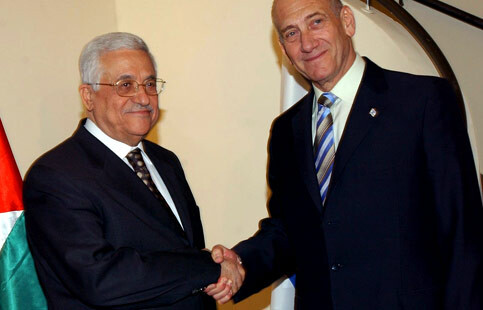The Electronic Intifada 18 April 2007

Palestinian President Mahmoud Abbas with Israeli Prime Minister Ehud Olmert in Jerusalem 15 April 2007. (MaanImages/POOL/PPO)
The latest back and forth between Israel and the Palestinian unity government (and its regional interlocutors) will not bring peace to fruition. Many respected commentators in the Middle East have accused Israel of rejecting peace, primarily due to its refusal to fully embrace the Arab peace initiative. Yet this initiative, when entered into the international community’s trash compactor of “pragmatism,” will leave the Palestinian people with nothing more than an old, albeit neatly packaged, version of the Oslo Accords. These commentators’ near-sighted, almost desperate view, which is predicated on the notion that anything is better than what the Palestinians are currently enduring, will only further devastate the Palestinian people. It is one thing to compromise on the implementation of the rights of Palestinians, but it is quite another to diverge from one’s principles based on “new realities” imposed on the conflict by one’s adversary. We must never forget the lessons of the Oslo period, nor can we forget that after 40 years of compromise and conciliatory action, Palestinian suffering has been exponentially magnified. The professed pragmatist line only diminishes the rights of the oppressed, strengthens the oppressor’s position, and makes a mockery of institutions (i.e. the United Nations) whose many functions ostensibly include the protection of persecuted peoples.
Many proponents of Palestinian rights naively argue, as is laid out in the Arab peace initiative, that all will be well once there is a full withdrawal from the occupied territories. But territorially, Israel withdrew from the Gaza Strip and yet the conditions inside Gaza reflect how autonomy alone does not mean independence. Israel continues to control Gaza’s imports and exports, its territorial waters, and its airspace — leaving 1.4 million people to suffocate in an open-air prison. Compounded by the sanctions slapped on 3.8 million occupied people, the West Bank, the Gaza Strip, and East Jerusalem continue to economically wither away, while the world sits idly by. It is not enough to demand autonomy, the preservation of the right to self-determination, and the right of return. Policy must be put in place by Israel and the West that ensures the economic sustainability for the Palestinian people. No people should be expected to recover after 40 years of imposed suffering without eventual restitution.
Assuming that full withdrawal is deemed unrealistic, what would semi-withdrawal mean for Palestinians? If Israel were to keep parts of the West Bank settlements (supposing the Apartheid wall was torn down), Israel would claim it to be “necessary,” as it did at Camp David in 2000, to effectively control half of the West Bank. If even one settlement were to remain, Israel, for “security” purposes, would not give up control of the Jordan Valley, and surely would maintain the “need” for Jewish-only roads, checkpoints, and a complete army apparatus that would further subjugate the Palestinian people to the oppressive measures of occupation. Israel is right on one point: a long-term hudna (cease-fire), as proposed by various Hamas officials, is insufficient, because the two peoples will never get passed a hudna if there is not an end to Israel’s matrix of control.
Detractors of the Palestinian plight have continued the tired policy of blaming the victim. Capitalizing on US President George W. Bush’s “war on terror” and the fight against “Islamic fundamentalism,” a multitude of pro-Israel commentators have criticized the rising religiosity in Palestinian society. Yet this rush to conservatism emanated from the failure of Fatah, which led a corrupt secular government that had done little for its people or the political establishment. Furthermore, the significant alternative forces within Palestinian society, which preach non-violence, an end to corruption, and a democratic environment that ensures the rights of all its citizens (socially, religiously and economically), have been silenced and stunted by their compatriots (namely Fatah during the Oslo years). Disturbingly, these alternative voices remain purposely ignored by Israel and the West. The impetus for this outright rejection stems from the fact that recognition of the Palestinian people, under the tenets of equality, is seen as a cancer for Israel’s “Jewish democracy.” For far too long, Yasser Arafat and his corrupt thugs in the Palestinian Authority, toed the line for Israel and cowered to the demands of the West, squandering the social energy and political capital of the first Intifada.
There is a direct correlation between the rise of conservatism in Palestinian society and Israel’s heightened policy of starvation and collective punishment, a policy that intensified during the Oslo years. During this period, like Ariel Sharon’s subsequent policy of “disengagement,” Israel passed off its actions to the international community as “peaceful” and “propitiative” measures that gave Palestinians autonomy. The separateness policy of Oslo, however, further ghettoized the Palestinian economy. A concerted effort was made to hinder Palestinian exports, stunt their labor force, increase travel restrictions, and back a corrupt Fatah force, which effectively operated as a proxy police force for Israel. The post-Oslo period, which was followed by economic instability and communal anger due to the “peace process” being exposed as a hoax, saw conservative groups continue to gain popular support within Palestinian society. Furthermore, the Fatah led government became evermore corrupt, while Israel and the West increasingly cultivated a hard-line approach to the conflict.
This leads back to the Arab peace initiative. There are already signs of Hamas being corrupted by the pragmatist line to ensure its power in the occupied territories. This is not to say that negotiations can’t and shouldn’t take place, but at this point, on all five sides (Hamas, Fatah, Israel, the US, and the Quartet), intention substantively matters more than words and action. The “disengagement” of Gaza led to widespread suffering, settlements doubled during the Oslo years, and after free and fair democratic elections, sanctions were placed on the Palestinian government. This goes to show how seemingly positive actions, when combined with sinister ulterior motives, can be even more damaging than the status quo. If steps are taken to improve the lives of Palestinians on a permanent basis, it should be welcomed, but neither Hamas nor Fatah should be tempted by calls for negotiations in return for, what would be, short-term political capitalization.
The Palestinian government will be facing some tough decisions in the coming months. While Olmert has rejected the totality of the Arab peace initiative, he has embraced its concept and seems willing to engage with the region diplomatically. Nonetheless, why would Israeli Prime Minister Ehud Olmert, the strongman who rationalized the devastating bombing campaign of Lebanon, want to engage in any kind of peace process with the Palestinians and its regional partners? Simply put, this is Israeli politics par excellence — if hard-line policy fails, champion supposed “peacenik” politics; if “dovish” policy fails, champion hard-line politics. Israeli Defense Minister Amir Peretz is an apt example. The once “peacenik” turned hard-liner is feverishly trying to revert back to his “dovish ways.”
While the world craves a quick resolution to the Israeli-Palestinian conflict, it is just not realistic. Without reconciliation based on justice for both peoples, peace will just be an idea pushed for by so-called pragmatists and the politically weak: both groups who have done more damage to the conflict than hard-liners on either side.
Edward Said wrote in his book, Peace and its Discontents: “[W]e must restore Palestine to its place not simply as a small piece of territory between the Mediterranean Sea and the Jordan River but as an idea that for years galvanized the Arab world into thinking about and fighting for social justice, democracy, and a different kind of future than the one that has been imposed on it by force and by an absence of Arab will.” His words, eleven years later, still ring true, yet they do not apply only to the people of Palestine, but rather for both peoples, Israeli and Palestinians: for if we are to see this conflict resolved, it must be based on mutual understanding and acceptance as well as a breakdown of racism and supremacy in all its forms.
Remi Kanazi is a Palestinian-American poet and writer based in New York City. He is the co-founder of www.PoeticInjustice.net and the editor of the forthcoming anthology of poetry, Poets for Palestine. He can be contacted at Remi@PoeticInjustice.net



